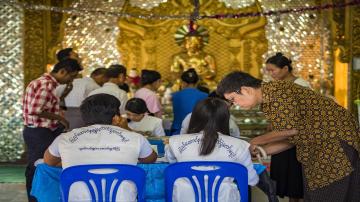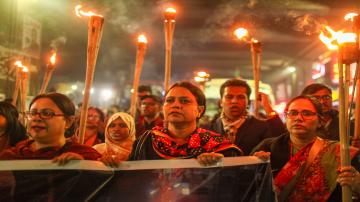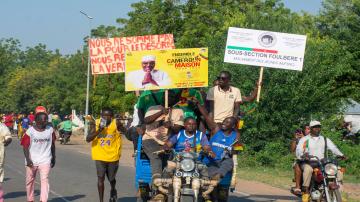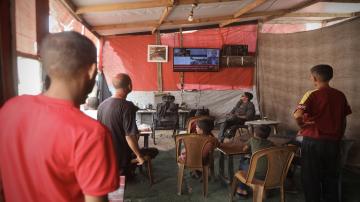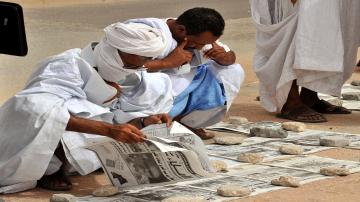Al Jazeera Journalism Review

Reporting the Spectacle: Journalism Under Siege in Myanmar’s Manufactured Elections
Myanmar’s recent elections posed a profound challenge for journalists, who were forced to navigate between exposing a sham process and inadvertently legitimising it. With media repression intensifying, reporting became an act of resistance against the junta’s effort to control information and silence independent voices.
Latest Articles
‘A sense of belonging has been taken away from us’ - the closure of the Kashmir Press Club
THE LONG READ: The closure of the Kashmir Press Club in January this year has come as a major blow to independent journalists in the troubled region who relied on it for camaraderie, respite and a ‘place to share ideas’

Reporter’s Notebook: Inside Europe’s largest brothel
While covering a story about a Spanish proposal to outlaw middlemen involved in prostitution, AJE senior correspondent Natasha Ghoneim and her team came up against a wall of silence, but managed to get a story nevertheless
The irony of fake news - sometimes it serves to highlight injustice
Last week, the image of a blonde-haired Palestinian girl standing up to an Israeli soldier was wrongly credited as an image of a Ukrainian girl confronting a Russian soldier. The intention was to garner sympathy for Ukraine - instead, it had a rather different outcome

Examining the imagery of women during wartime
ANALYSIS: Some images of women in Ukraine have gone viral in the past week. But what do these specific images add to the narrative surrounding the Russian invasion and what of the women who don’t fit the media image of the “ideal” female?

Investigating racist conviction laws in America - and seeing a man freed after 25 years
REPORTER’S NOTEBOOK: How a team of journalists spent nearly a year investigating the conviction and 25-year imprisonment of Brandon Jackson and then watched him walk free

‘Heroes’ and ‘worthy’ refugees - the hypocrisy of Western media over Ukraine
While news anchors marvel at how refugees from Ukraine are ‘just like us’ and glorify women taking up Kalashnikovs against Russian invaders, we compare their treatment with that of Syrian and Afghan refugees, and Palestinian resistors

Opinion
Annie Zaman
Reporting the Spectacle: Journalism Under Siege in Myanmar’s Manufactured Elections
Myanmar’s recent elections posed a profound challenge for journalists, who were forced to navigate between exposing a sham process and inadvertently legitimising it. With media repression…
Arsalan Bukhari
Public Hostility Toward Legacy Media in Bangladesh
The December 2025 arson attacks on Prothom Alo and The Daily Star marked a turning point for journalism in Bangladesh. As public anger replaces state control as the primary threat, reporters are…
Salma Saqr
Migration Issues and the Framing Dilemma in Western Media
How does the Western press shape the migration narrative? Which journalistic frames dominate its coverage? And is reporting on anti-immigration protests neutral or ideologically charged? This…
Diaries
From News Reporting to Documentation: Practical Lessons from Covering the War on Gaza
From the very first moment of the genocidal war waged by Israel on Gaza, Al Jazeera correspondent Hisham Zaqout has been a witness to hunger, devastation, war crimes, and the assassination of his colleagues in the field. It is a battle for survival and documentation, one that goes beyond mere coverage and daily reporting.

A Sudanese Journalist in the Grip of the Rapid Support Forces
She was arrested, tortured, nearly raped, threatened with death, and subjected to degrading abuse. Her brother was brutally mistreated in an effort to locate her. In the end, her family had to pay a ransom to secure her release. She sought refuge abroad, but eventually returned to Sudan to continue documenting the war’s toll, particularly in El Fasher, a city now under siege. This is the harrowing account of a Sudanese journalist detained and tortured by the Rapid Support Forces.

Anas Al Sharif; Killed by Israel, but His Final Words Will Echo far Beyond His Death
For over a year and a half, Anas Jamal al-Sharif refused to leave northern Gaza, documenting the destruction and loss that others tried to hide. Tonight, Israel silenced his voice, but his final words, written on April 6, will echo far beyond his death.

Reports
Reporting the Spectacle: Journalism Under Siege in Myanmar’s Manufactured Elections
Myanmar’s recent elections posed a profound challenge for journalists, who were forced to navigate between exposing a sham process and inadvertently legitimising it. With media repression intensifying, reporting became an act of resistance against the junta’s effort to control information and silence independent voices.

Public Hostility Toward Legacy Media in Bangladesh
The December 2025 arson attacks on Prothom Alo and The Daily Star marked a turning point for journalism in Bangladesh. As public anger replaces state control as the primary threat, reporters are reassessing personal safety, editorial judgement, and professional credibility in a political transition where journalism itself is increasingly treated as an enemy.

Migration Issues and the Framing Dilemma in Western Media
How does the Western press shape the migration narrative? Which journalistic frames dominate its coverage? And is reporting on anti-immigration protests neutral or ideologically charged? This analysis examines how segments of Western media echo far-right rhetoric, reinforcing xenophobic discourse through selective framing, language, and imagery.
Polarised, Intimidated, Silenced: The Media Under Siege in Cameroon’s Election
Cameroon’s 2025 presidential election exposed a troubling paradox: a nation voting under the watchful eye of power, while its press remained silenced. From the arrest of a teenage reporter to bans on political debate and digital manipulation, freedom of expression is under siege, and journalism is on trial.

What Image of Gaza Will the World Remember?
Will the story of Gaza be reduced to official statements that categorise the Palestinian as a "threat"? Or to images of the victims that flood the digital space? And how can the media be transformed into a tool for reinforcing collective memory and the struggle over narratives?

Journalism in Mauritania: Behind the Facade of Press Freedom Indicators
Mauritania holds the top position in the Arab world in the Press Freedom Index published by Reporters Without Borders. However, behind this favourable ranking, the media and journalists face significant challenges, chief among them the ambiguity surrounding the definition of a "journalist" and the capacity of media professionals to fulfil their roles in accountability and oversight. Despite official efforts, the defining feature of Mauritania’s media landscape remains its persistent state of fluctuation.


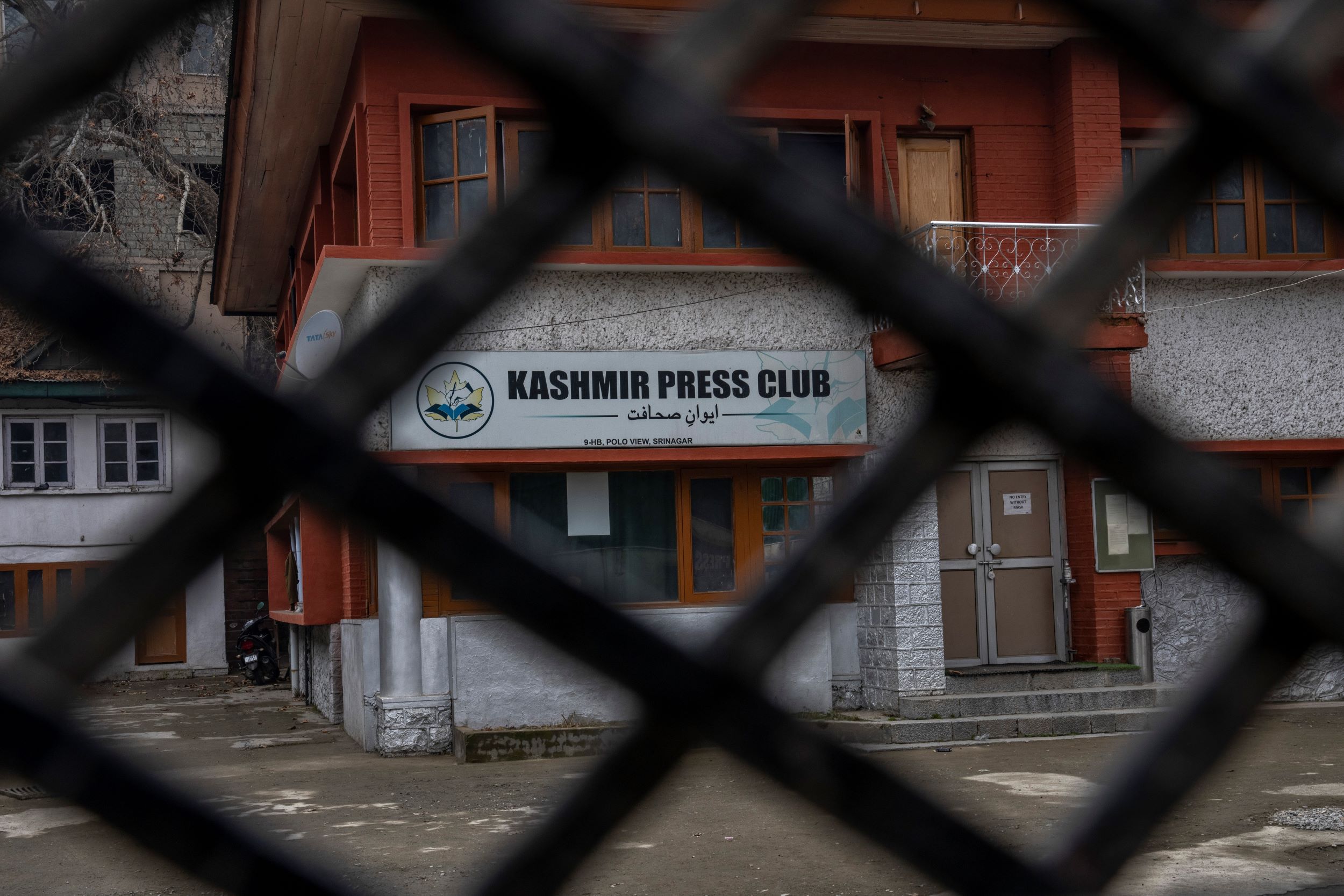

![A woman and a child wait for a call to cross the passport control after arriving in a train from Kyiv at the Przemysl main train station on February 27, 2022 in Przemysl, Poland. [Omar Marques/Getty Images]](/sites/default/files/ajr/2022/ResizeGettyImages-1373177290.jpg)


